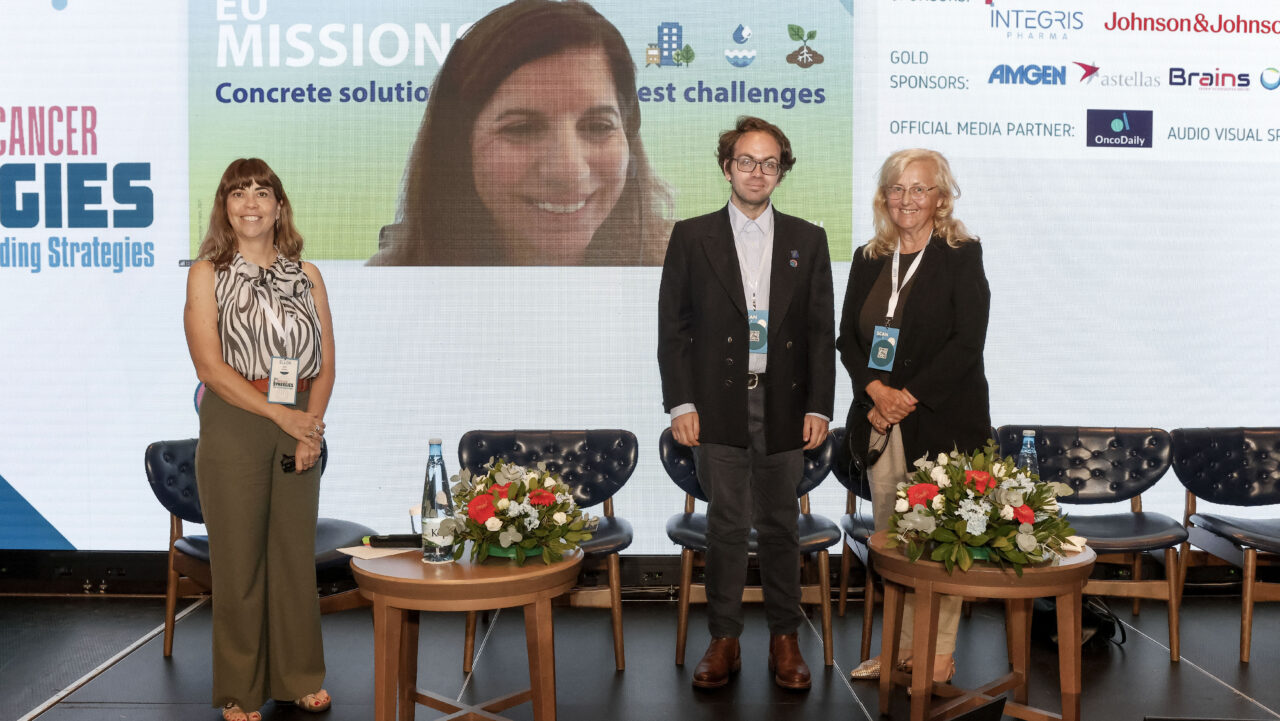
Uniting for Impact: Rethinking Cancer Policy and Research Through the EU Cancer Mission at the 2nd Synergies Forum on Cancer
The 2nd Synergies Forum on Cancer, organized by ELLOK, featured a pivotal panel discussion on one of the most urgent and transformative efforts within the EU health agenda: the Cancer Mission. The session, titled “Cancer Mission: Funding Research and Reshaping Cancer Care Policy,” brought together experts from across Europe to reflect on how the Cancer Mission is driving not only scientific advancement but also structural, social, and financial shifts in how cancer is addressed at both national and EU levels.
The panel was moderated by Anabela Lopes Isidro and featured insights from Christos Tsagkaris, Eleni Tolma, and Nevenka Maher, each bringing a unique lens from their respective countries and fields of expertise.
Cancer as a Systems Challenge: A European-Level Maturity Model
Opening the panel, Dr. Christos Tsagkaris framed the Cancer Mission within a broader European and humanitarian context, touching on its symbolic and practical significance in reshaping healthcare.
“If we go out on the street, the problem can be called a climate change, it can be called economic instability, it can be disease, famine, war. Cancer is a universal challenge, one the EU has recognized as one of its top six missions.”
Dr. Tsagkaris emphasized that cancer has evolved into a systemic issue that tests the maturity of institutions, clinical infrastructures, and policy frameworks.
“The mission makes cancer a model for European-level treatment. It forces us to mature our systems, clinically, scientifically, economically.”
He also underlined that cancer care must expand beyond treatment to include rehabilitation, quality of life, and even cosmetic and post-treatment support.
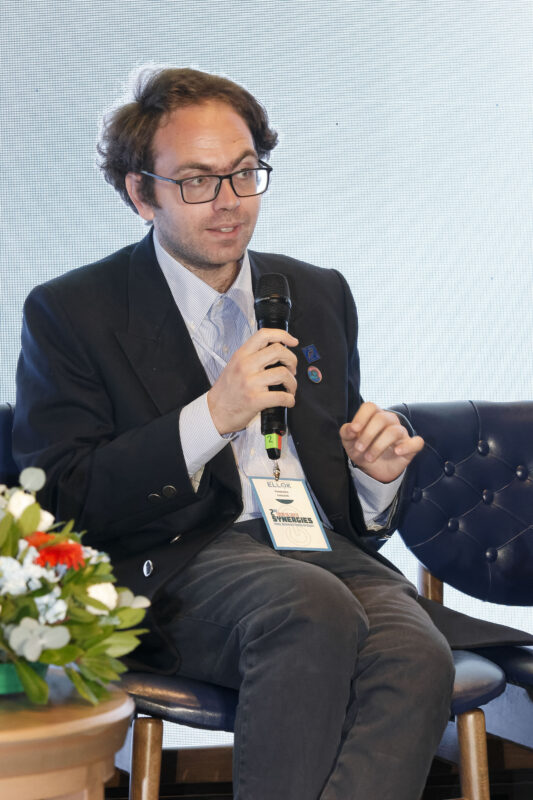
The Mission Logic: Moving from Research to Societal Transformation
Dr. Eleni Tolma provided a deep dive into the EU Cancer Mission’s logic model, emphasizing that the initiative seeks more than scientific output, it aims for societal transformation.
“The Cancer Mission is trying to promote what is called societal impact, beyond Horizon Europe. From initial funding, we develop mission governance, both at EU and member state levels, which then moves into public and private sector engagement. We’re not yet at the impact phase. We’re in the phase of process. Implementation is key—without proper implementation, we won’t see any transformative outcomes.”
Highlighting the needs of smaller EU states, Tolma added:
“Don’t forget the small member states, Cyprus, Slovenia, Luxembourg, each faces unique issues. We’ve made recommendations, but more funding is needed to help ECOs move from coordination to actual implementation.”
From Data to Understanding: A Holistic Approach to Cancer
Bringing a macro-level view to the table, Nevenka Maher, member of the EU Cancer Mission Board, emphasized the holistic and systemic nature of cancer and the scale of the problem.
“Two years ago, there were 20 million cancer cases globally. By 2050, this will increase by 77%. It’s not just a medical problem, it’s emotional, spiritual, and societal. The UNCAN project was launched to gather all information and data to understand cancer holistically. This is not easy—but essential.”
Maher spoke about the importance of the UNCAN initiative (Understanding Cancer), which uses AI and data-driven tools to build a foundational knowledge base for prevention and treatment strategies. She underscored that innovation within the Cancer Mission must go beyond technology:
“It’s not just technical innovation we need, it’s social innovation. Governance systems, management performance, organizational reform—all are part of transforming cancer care.”
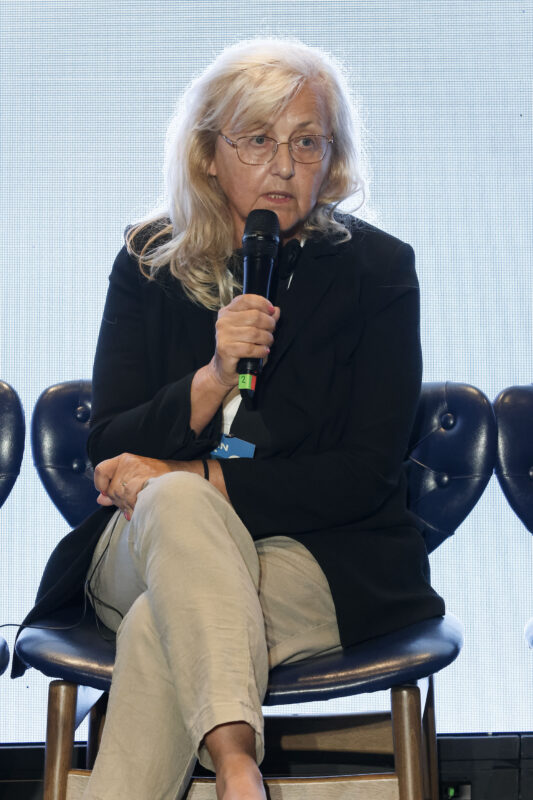
Funding Realities: Ambitions vs Budget
While ambitious in scope, Maher also pointed out that funding remains a core constraint.
“Many think the budget is enormous. But in reality, the Cancer Mission is allocated only €760 million for the entire 7-year financial period. It’s not enough. Your ministry is doing excellent work, especially using RRF funds for cancer initiatives. Some countries haven’t even done that.”
She stressed the importance of leveraging other EU programs, including EU4Health, Digital Europe, and the Recovery and Resilience Facility (RRF). Greece was commended for effectively utilizing these mechanisms. However, Maher cautioned that without public system accountability and capacity-building, the gap between ambition and reality could widen:
“Without prevention and responsibility at the individual, organizational, and state level—it won’t be possible to conquer cancer. Governance capacity is critical.”
Greece’s Role and the Broader European Landscape
Throughout the session, Greece was repeatedly praised for its alignment with the Cancer Mission. The establishment of a National Cancer Mission Hub and recent policy reforms were highlighted as best practices. Dr. Tsagkaris also offered insights from a non-EU perspective, based on his current role in Switzerland:
“Switzerland, though outside the EU, participates in Horizon Europe. The priorities of the Cancer Mission are not only medical—they include research, rehab, social recovery. This multi-dimensional view is essential and being implemented in clinics, national institutes, and civil society organizations such as ELLOK.”
He also pointed to the importance of decentralization and warned against losing momentum post-COVID:
“We must prove that decentralization works and must be preserved—not just for cancer but for cardiovascular and other chronic diseases.”
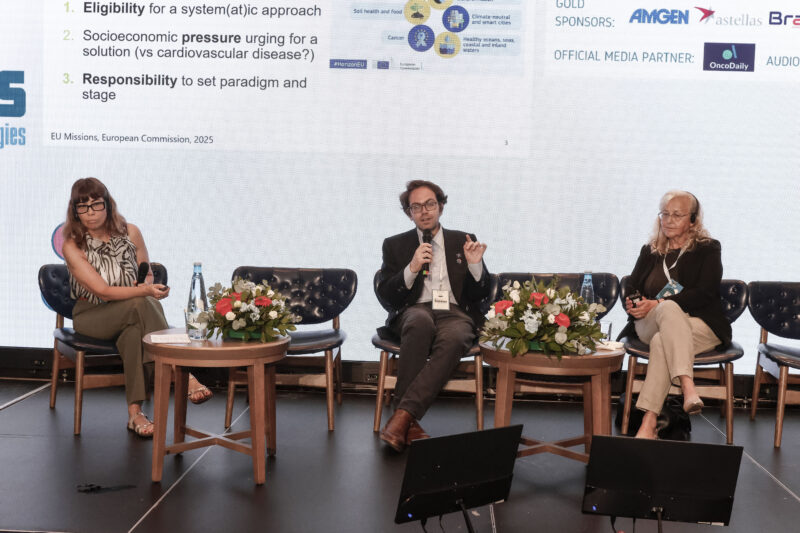
Governance and Future Models
The panel explored how various countries are developing governance mechanisms to integrate the Cancer Mission. Tolma mentioned structures such as “MIRROR groups” (to mirror the EU governance) and task forces involving inter-ministerial cooperation, such as those in Austria.
“Different countries are experimenting. What’s important is that national plans align with EU objectives, and that implementation is tracked with proper indicators.”
Final Reflections: Lessons to Carry Forward
As the session closed, each speaker offered a single takeaway that must not be lost as the Cancer Mission evolves:
• Eleni Tolma:
“Capacity building, of individuals, organizations, and governance structures. And more funding for ECOs to move from planning to action.”
• Nevenka Maher:
“We need strong public health systems. The conflict between private and public care must be acknowledged. Without good governance, we cannot deliver even basic cancer services.”
• Christos Tsagkaris:
“The future of cancer care lies in sustainability, geographic, economic, and institutional. We must not lose sight of that shift.”
Conclusion: A Roadmap in Progress
The Cancer Mission represents one of the most ambitious attempts to reshape how Europe fights cancer, not only through science but through social change, funding reform, and cross-border collaboration.
This panel highlighted the critical need for realistic funding, innovative governance, inclusive stakeholder engagement, and a commitment to equity including for smaller and widening countries.
As Maher aptly noted, “We are still in the enabling phase—true impact may take years. But the foundations we build today will determine the outcomes we see tomorrow.”
About the 2nd Synergies Forum on Cancer – Policy, Research and Funding Strategies
Following the success of the 1st Greek Forum on Cancer in July 2024, which highlighted the pressing need for strategic cancer-related health policies, the Hellenic Cancer Federation – ELL.O.K. continues its mission with the organization of the 2nd Synergies Forum on Cancer: Policy, Research & Funding Strategies, to be held on 30 June and 1 July 2025 at the Wyndham Grand Athens Hotel.
This year’s Forum seeks to foster dialogue and cooperation among stakeholders with a central goal: to improve the quality of life for cancer patients through the development and implementation of effective, sustainable health policies. Towards this, a key focus will be the optimal utilization of the European Cancer Mission, connecting cutting-edge research with clinical practice to deliver real-world solutions for both patients and healthcare systems.
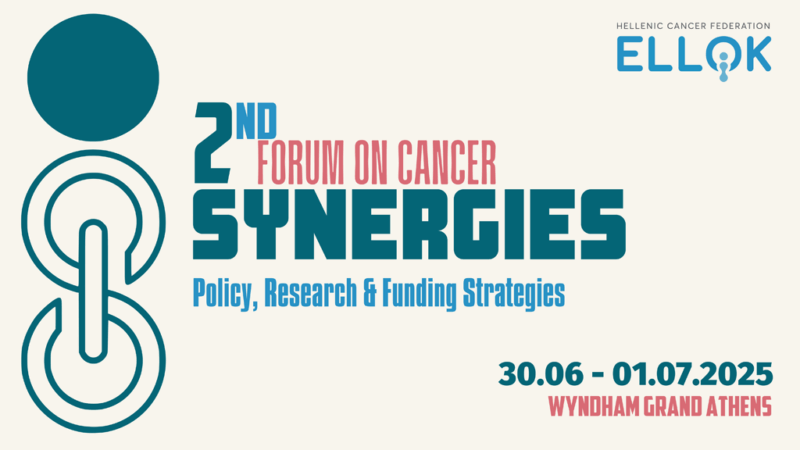
-
Challenging the Status Quo in Colorectal Cancer 2024
December 6-8, 2024
-
ESMO 2024 Congress
September 13-17, 2024
-
ASCO Annual Meeting
May 30 - June 4, 2024
-
Yvonne Award 2024
May 31, 2024
-
OncoThon 2024, Online
Feb. 15, 2024
-
Global Summit on War & Cancer 2023, Online
Dec. 14-16, 2023
